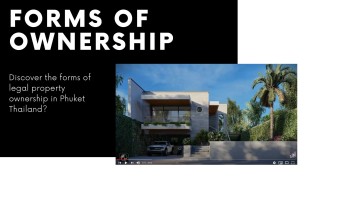Forms of Legal Ownership in Thailand

Forms of Legal Ownership in Thailand
The most important issue for potential property buyers is to understand the different forms of legal ownership in Thailand. Only with such knowledge (together with an understanding of land titles and ownership structures) can a buyer properly understand what is being offered to him or her.
The starting point of this understanding is the necessity to look beyond physical property descriptions - such as villas, condos, and townhomes - and to start understanding legal ownership in Thailand in terms of legal rights. Legal ownership rights are the most fundamental issue to get to grips with if you want to buy a property and safely secure legal ownership in Thailand.
It is the interplay between the type of legal ownership and the various possible holding structures that on the surface make Thai property law appear complex. However, being familiar with the different forms of legal ownership and what foreigners can and cannot own provides the foundation for understanding everything that follows.
Condominium Freehold Title
Registered condominiums hold a special legal type of freehold that foreigners can directly and legally own in Thailand referred to as condominium foreign freehold ownership. Registered condominiums are governed by legislation contained in the Thai Condominium Act which clarifies the law for property developers and provides a degree of “consumer protection” for foreign buyers. This means that developers must follow certain procedures and comply with certain regulations in order to obtain a registered condominium title. This is one of the easiest ways for foreigners to acquire property in Thailand, and it is the clearest, most straightforward, and unambiguous form of ownership in Thailand.
Condominium Leasehold
According to the Condominium Act, only 49% of the units can be allocated to foreign freehold ownership. It is still possible for foreigners to purchase the remaining 51% of the building, although such purchases must be made on a leasehold basis. Therefore, in cases where there is insufficient interest from Thai nationals, a registered condominium project could for all practical purposes be completely sold as a foreign freehold and leasehold to foreigners.
The land offices in Thailand refuse to register condominium and apartment leases for more than 30 years, although they do allow private agreements to contain lease renewals. Consequently, great efforts are made by registered condominium developers to provide buyers the opportunity to acquire longer leasehold periods. It is common to come across a 30+30+30-year condominium leasehold structure in Phuket.
Apartment Leasehold
In Thailand, apartment buildings differ from registered condominium developments. With apartment buildings, buyers only receive an interest in their separate units and no shared interest in the common area. Apartment owners also have no say in the management of the building. Most importantly, apartment buildings are not governed by the Thai Condominium Act and do not go through the cumbersome process of becoming a registered condominium titled development.
Villa Ownership
Foreigners can buy and own buildings and structures, such as villas distinct from the land on which it sits. They can own these structures as freehold ownership in Thailand.
Land Ownership
The three most popular ways for foreigners to control or purchase land are:
Long-Term Leasehold Agreements
A leasehold is an interest in land or property whereby the leaseholder does not actually own the land but is granted the right of exclusive possession and use of the property. A lease is not just a contractual agreement; it is also a registrable legal interest against the freehold title document. Once registered, the lease becomes a lien upon the title deed which serves as notice to anyone who attempts to purchase the underlying land that the lease exists and that by purchasing the land they would be subject to the lease.
The maximum lease period currently permitted under Thai law is 30 years. Most developers allow for lease extensions to be put in the contract for 30+30+30 years. As a legal interest, it also means that the lease can be bought, sold, and transferred. Make sure that your contract has a succession clause. Your leasehold contract should also include an option to transfer to freehold should Thai laws change in the future to allow foreigners direct land ownership in Thailand.
However, the Finance Minister of Thailand is considering amending the current laws to allow foreigners to buy land under the 50-year leasehold structure (published by Bangkok Post in March 2017). If this happens, we can expect another property boom with this change in ownership in Thailand.
Leasehold with a Share of Freehold
Many developers are now offering this innovative approach to provide leaseholders with additional security and a greater degree of control over their own lease renewals. The developer sets up a Thai company that owns the land on which the estate sits and each owner of the estate is given an equal share of this Thai company. With a leasehold with a share of the freehold structure, in addition to legal registration of the initial 30-year lease, purchasers also become part owners of the freehold, which grants control over lease renewals. This is commonly used by off-plan developers marketing to foreigners.
Thai Private Limited Company
Current Thai law does not allow foreigners to own a direct freehold interest in land, so using a Thai private limited company has, therefore, become an “accepted method” for buying and holding freehold property in Thailand.
In order to be considered a Thai company, at least 51% of the company shares must be Thai-owned, and at least three shareholders are required to register a Thai company. The Thai shareholders might own more of a company than the foreigner by having a majority of the registered share capital, but the foreigner controls the company through voting rights according to different classes of shares.
Many safeguards can be put in place to protect the foreign shareholders and local qualified accounting and the legal firms can be engaged to help with this process. It should be noted that whether you are buying a property in Koh Samui, Phuket, or Krabi, the underlying legal principles are the same regarding legal ownership in Thailand.
Conclusion
We suggest consulting a local property law firm when it comes to ownership structures and what is best for you. Your real estate agent will also be able to guide you safely through the process with the help of your legal counsel. Our fee is paid by the seller so buyers pay nothing for our services. Contact us today so we can start to move you forward.
Whether you're looking to purchase a property or sell a property, we focus on your requirements, listen to your stated needs, and work hard to achieve 100% client satisfaction.

